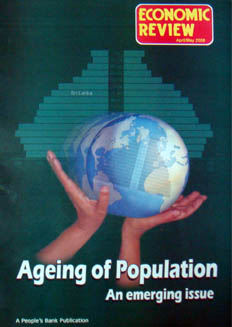Abstract
The demographic transition from high birth and death rates to relatively low fertility and mortality levels during the past five decades has increased the share of older people in the total population. Population ageing in Sri Lanka in the coming decades will, therefore, pose important social challenges to the elderly due to the rapid changes in social norms, migration, increased female participation in the labor force outside the home, and the breakdown of the traditional extended family system.
The majority of older persons in Sri Lanka continue to live in multigenerational households, most of them with their children and grandchildren. However, the decrease in the number of children per family and their dispersion due to migration would result in a smaller number of children available for home care. Nevertheless, due to the changes in the population age structure, there will be more than twice the number of people in the age group 50 to 64 years to those 65 years and over in the population particularly females who can provide care to the elderly.
The contribution of the elderly to their children has been growing in recent years. The elderly also provide opportunities for young families. With the changes in family structure, the notion of grandparenting has assumed importance in household activities. When both parents are employed outside the home or when women migrate for employment abroad, older persons, mainly grandmothers act as primary caregivers for children and other family members.
In urban settings, social networks developed though neighbors and friends over the life course form an important source of supplementary support for the elderly and add to their social capital.
Participation in the economic and social life of the community enables older persons to contribute productively to society. The older persons with their ever-increasing numbers in the total population have the potential to become more influential politically, economically, and socially. Older persons should, therefore, have the opportunity to actively engage in the development process so that their skills, experience, and knowledge can be utilized for the development of the country.
Neglect and abuse of older persons are seen to be prevalent in many societies both in developed and developing countries. However, the lack of data and precise measurement instruments and the absence of reporting mechanisms are major constraints to measuring the magnitude of the problem across societies. There are also problems of comparability due to cultural reasons. For instance, overburdening older persons with family responsibilities may be perceived as elder abuse in some cultures, but in others, it may be considered as part of tradition.
The proportion of the Sri Lankan elderly population 60 years and over to the total population will increase from 11.2 percent in 2007 to 18.4 percent in 2025 and to 29.4 percent in 2050. The proportionate share of the very old (80 years and over) will increase by nearly fivefold during the same period. The sex ratio of the elderly will continue to decline indicating that there will be more females than males in the older ages as a result of higher mortality rates of men at advanced ages. The ageing index which is the ratio of the population aged 60 years and over to that under age 15 years will increase from 47.9 to 179.2 between 2007 and 2050. This rapidly increasing trend will lead to compelling demands for changes in the way resources are allocated among generations.
The challenge for the future, therefore, is to ensure that older persons can live with full rights and continue to participate in the social and economic life of the country with dignity.

